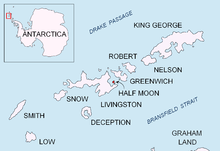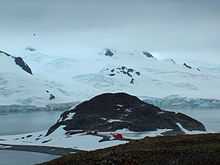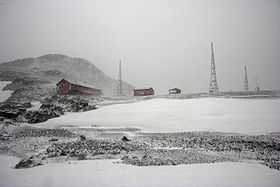Half Moon Island
 Half Moon Island from Kuzman Knoll, Livingston Island, with Greenwich Island in the background | |
 Location of Half Moon Island in the South Shetland Islands | |
| Geography | |
|---|---|
| Location | Antarctica |
| Coordinates | 62°35′S 59°55′W / 62.59°S 59.91°W |
| Archipelago | South Shetland Islands |
| Area | 171 ha (420 acres) |
| Country | |
| Demographics | |
| Population | 0 |
| Additional information | |
| Administered under the Antarctic Treaty System | |
Half Moon Island is a minor Antarctic island, lying 1.35 km (0.84 mi) north of Burgas Peninsula, Livingston Island in the South Shetland Islands of the Antarctic Peninsula region. Its surface area is 171 hectares (420 acres).[1] The Argentine Cámara Base is located on the island. It is only accessible by sea and by helicopter; there is no airport of any kind. The naval base is operational occasionally during the summer, but is closed during the winter.
Flora and fauna
Plants found on the island include several lichen and moss species as well as Antarctic Hairgrass.[1]
The island has been identified as an Important Bird Area (IBA) by BirdLife International because it supports a breeding colony of about 100 pairs of south polar skuas. Other birds nesting on the island include chinstrap penguins (2000 pairs), Antarctic terns (125 pairs), kelp gulls (40 pairs), Wilson's and black-bellied storm petrels, Cape petrels, brown skuas, snowy sheathbills and imperial shags.[1]
Weddell and Antarctic fur seals regularly haul out on the beaches. Southern elephant seals have been recorded.[1] Whales are often seen patrolling the shores.
Access
The island is used as a stop during Antarctic cruises, with the peak of visitation during November–March. There is a 2,000 m (2,200 yd) walking track on the southern part of the Island which allows tourists to get a close view of the wildlife (mainly chinstrap penguins and skuas), and of the surrounding mountainous scenery of nearby Livingston and Greenwich Islands. The path begins on the south side of Menguante Cove, runs westwards along the beach to Cámara Base, then turns north along the head of Menguante Cove, and eventually ascends northeastwards to the top of Xenia Hill.[2]
Google Street View
In September 2010, Google added Street View imagery of Half Moon Island to its Google Earth and Google Maps services.[3] The expansion of Google Street View onto the island means all seven continents had imagery through the service.[4] As the island has no roads, the images appear to have been taken with a camera on a tripod. The shadow of the photographer can clearly be seen if one were to move the view so as to look at the ground. Also, the iconic Pegman from Google was replaced with a Penguin, due to the island's use as a breeding colony by them.
Images
-

The wreck of an old whaling boat, located at the south end of Island.
-

Half Moon Island.
-

View of Cámara Base as seen from Xenia Hill.
-

View of Cámara Base.
See also
- Composite Antarctic Gazetteer
- List of Antarctic islands south of 60° S
- Livingston Island
- SCAR
- Territorial claims in Antarctica
Maps
- L.L. Ivanov et al., Antarctica: Livingston Island and Greenwich Island, South Shetland Islands (from English Strait to Morton Strait, with illustrations and ice-cover distribution), 1:100000 scale topographic map, Antarctic Place-names Commission of Bulgaria, Sofia, 2005
- L.L. Ivanov. Antarctica: Livingston Island and Greenwich, Robert, Snow and Smith Islands. Scale 1:120000 topographic map. Troyan: Manfred Wörner Foundation, 2009. ISBN 978-954-92032-6-4
-

Half Moon Island map
-

Topographic map
References
- ↑ 1.0 1.1 1.2 1.3 "Half Moon Island". BirdLife data zone: Important Bird Areas. BirdLife International. 2013. Retrieved 2013-01-01.
- ↑ Google (March 13, 2012). "Half Moon Trail". Google Maps. Google. Retrieved March 13, 2012.
- ↑ "Official Google Blog: Explore the world with Street View, now on all seven continents". Google. 2010-09-30. Retrieved 2010-10-02.
- ↑ Halliday, Josh (September 30, 2010). "Google Street View: No more privacy for penguins as Antarctica gets mapped". The Guardian (London). Retrieved March 13, 2012.
External links
| Wikimedia Commons has media related to Half Moon Island. |
- Images from Half Moon Island
- Videos and photographs of birds of Half Moon Island (including chinstrap penguin, Antarctic shag, pale-faced sheathbill, Wilson's storm petrel and kelp gull) on the Internet Bird Collection
- "Google Street View hits Antarctic". BBC.
| ||||||||||||||
Coordinates: 62°35′24″S 59°54′36″W / 62.59000°S 59.91000°W